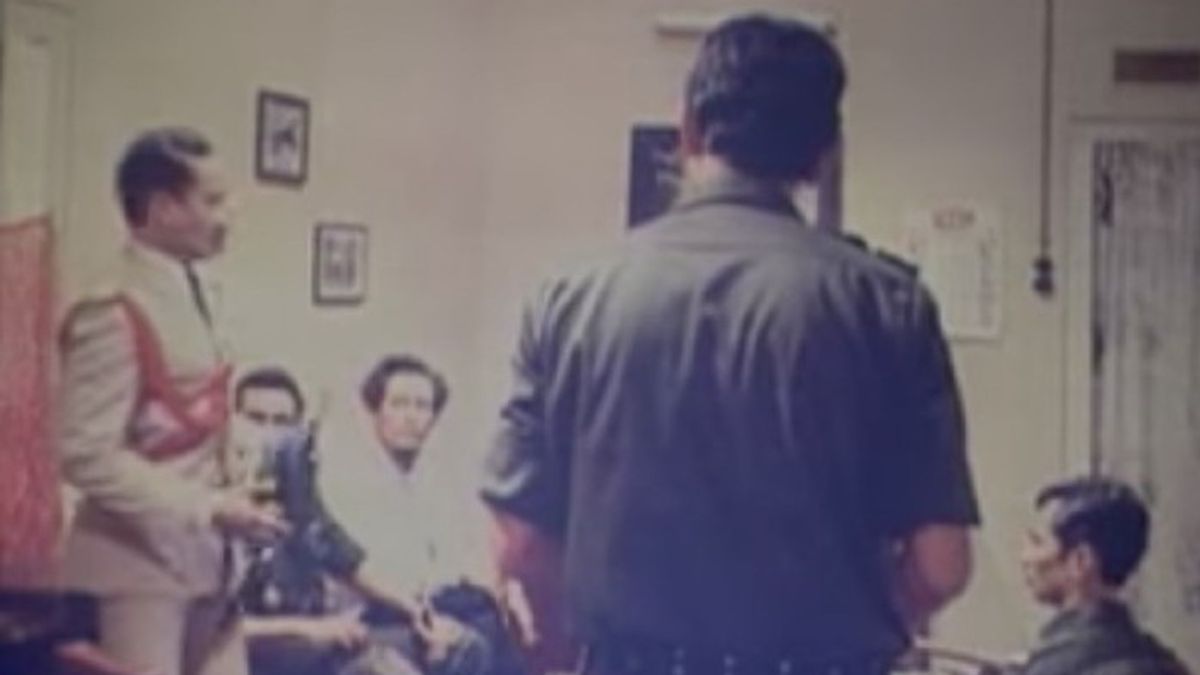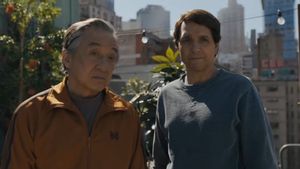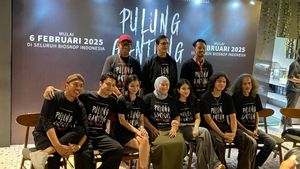JAKARTA - The suppression of the betrayal of the G30S PKI (1984) had become a mandatory spectacle every September 30 on national television. There's a lot of controversy. The dominance of fictional content over fact is the reason. The public all over the country are aware of the many mistakes in Arifin C. Noer's film. The film later disappeared from national television. Its mandatory broadcast was stopped in 1998, shortly after Suharto stepped down.
Control of history during the New Order (Orba) was carried out massively. Under the blessing of “Prabu” Suharto, historical control was manifested in a variety of mediums, from history books to films. There are various forms of control. Sometimes the New Order tried to reduce the role of Soekarno and other national figures. Sometimes the New Order also exaggerated Suharto's services.
The most obvious example is the New Order's trick of trying to eliminate Soekarno's image in a photo regarding the raising of the flag during the Proclamation of Indonesian Independence. However, this effort failed because it received a lot of protests. A series of other efforts were launched by the New Order to elevate Suharto's heroism in the nation's history.
The state then began to finance much of the writing of history, including popular history, military history, oral history, and other activities. New Order also carried out strict censorship of the books in circulation. Moreover, the book contains many teachings of national figures such as Soekarno.
“This symbol of greatness is immovable. Suharto's sophistication in maintaining the image and power of his regime was truly masterful. A number of concepts and policies were made. We remember that through the subjects of History and Struggle or Pancasila Moral Education, Suharto's role was very prominent."
“Values about it are embedded so strongly. Suharto played a key role in the entire series of struggles from the March 1 Oemoem Attack in Yogyakarta to the crushing of the PKI and its accomplices,” said FX Baskara Tulus Wardaya in his book Uncovering the Mysteries of Suharto's Power (2007).

In order to perpetuate its power, the New Order regime also began to equip it with a series of terror. Suharto deliberately became a feared leader. The image is considered effective. Suharto cleverly complemented his power by creating fear machines not only among his followers, but among the Indonesian people.
These include machines of terror, machines of repression, and machines of violence. No one dared to vilify Suharto's image. when the bad image comes from the mass media, the media will be banned. When a bad image emerges from officials, his political career will be stopped.
“In the life of the state, the pattern of interaction and communication comes from one door, namely Suharto's lips. Put a word, in a snap of a finger, all the problems that exist will be resolved by itself. This power is like a scourge in these 32 years and has rolled the horror and anger of the Indonesian people," wrote Femi Adi Soempeno in the book They Betrayed Me: Attitudes of Suharto's Golden Children at the End of the New Order (2008).
The PKI G30S betrayal film polemicIn order to strengthen Suharto's heroism, the New Order began to use the medium of film. The film path was chosen by the New Order to show that Suharto – even though he was feared – had a big hand in the history of the nation. The presence of the film Penumpasan Pengkhargaan G30S/PKI (1984) by Arifin C. Noer is proof.
It became one of the most successful propaganda films of the 20th century. This success is because national television is obliged to show a film every September 30. Or the anniversary of the failed coup that was predicted by the Indonesian Communist Party (PKI).
In addition, teachers in schools have a new role every September 30. They had to escort and tell their students to go to the local cinema in order to watch propaganda films.
As a result, the most expensive film that was worked on with a budget of Rp800 million broke many records. The screening of this film even surpassed 699,282 viewers in 1984. Which, this record made it the highest-grossing film in New Order history.

“This film creates a collective memory of the nation. In 2000, Tempo Magazine published a survey of students in Indonesia's largest cities. Overall, 97% of respondents have watched this film, most of them many times. Nine out of ten people use the film as their main source of information about the events of 1965,” explains Michael G. Vann in the book The Cold War and Asian Cinemas (2019).
With the popularity of the film Pengkhargaan G30S/PKI, new facts were later revealed. The film actually contains more fiction than fact. The younger generation could not resist the 271 minute film being screened every year on national television until 1998.
“The problem is that the generation that has seen the film has only been exposed to the history of the tragedy 65 through the single version of the New Order. As a result, the cognitive and affective trauma of society is not easily lost and gives rise to pros and cons for the next generation. Meanwhile, the generation born in the reform era who was not exposed to the film 'Penumpasan Pengkhargaan G30S/PKI', history will be confusing for them. Worst of all, the state can give birth to the next generation who are blind to history," said Taufan Hariyadi in the book Virtual Madness (2021).
The massive image development created many other historical events for the stepchildren. All parts of history were only created from the New Order kitchen, which was best to keep Suharto in control of Indonesia for 32 years.
Changes were only obtained when Suharto stepped down in 1998. The Minister of Information (Menpen) at that time, Muhammad Yunus, began to feel uncomfortable with the cult of figures such as in the film Penumpasan Pengkhargaan G30S/PKI. He argued that the film was no longer in accordance with the dynamics of the Reformation. Moreover, on September 30, 1998 onwards, TVRI and other national television stations will no longer broadcast the film Pengk betrayan G30S/PKI.

"According to some circles, especially historians, during the New Order era, historical engineering has taken place for the benefit of the authorities. After Suharto fell in 1998, a lawsuit arose against the writing and education of history 'that had occurred so far. Several controversial events such as the birth of Pancasila, the General Offensive on March 1, 1949, the G30S, Supersemar, and the Integration of East Timor were questioned again by the public.”
“The banned books have been reprinted. Biographies and memoirs of the victims of the New Order were widely published. Oral histories were used to reveal the testimonies of these victims. After 2000, the intensity of this historical "straightening" study has increased," concluded M. Faishal Aminuddin in the book Globalization and Neoliberalism: Influence and Impact on the Democratization of Indonesia (2009).
*Read other information about the NEW ORDER or read other interesting articles from Detha Arya Tifada.
Other MEMORIESThe English, Chinese, Japanese, Arabic, and French versions are automatically generated by the AI. So there may still be inaccuracies in translating, please always see Indonesian as our main language. (system supported by DigitalSiber.id)









